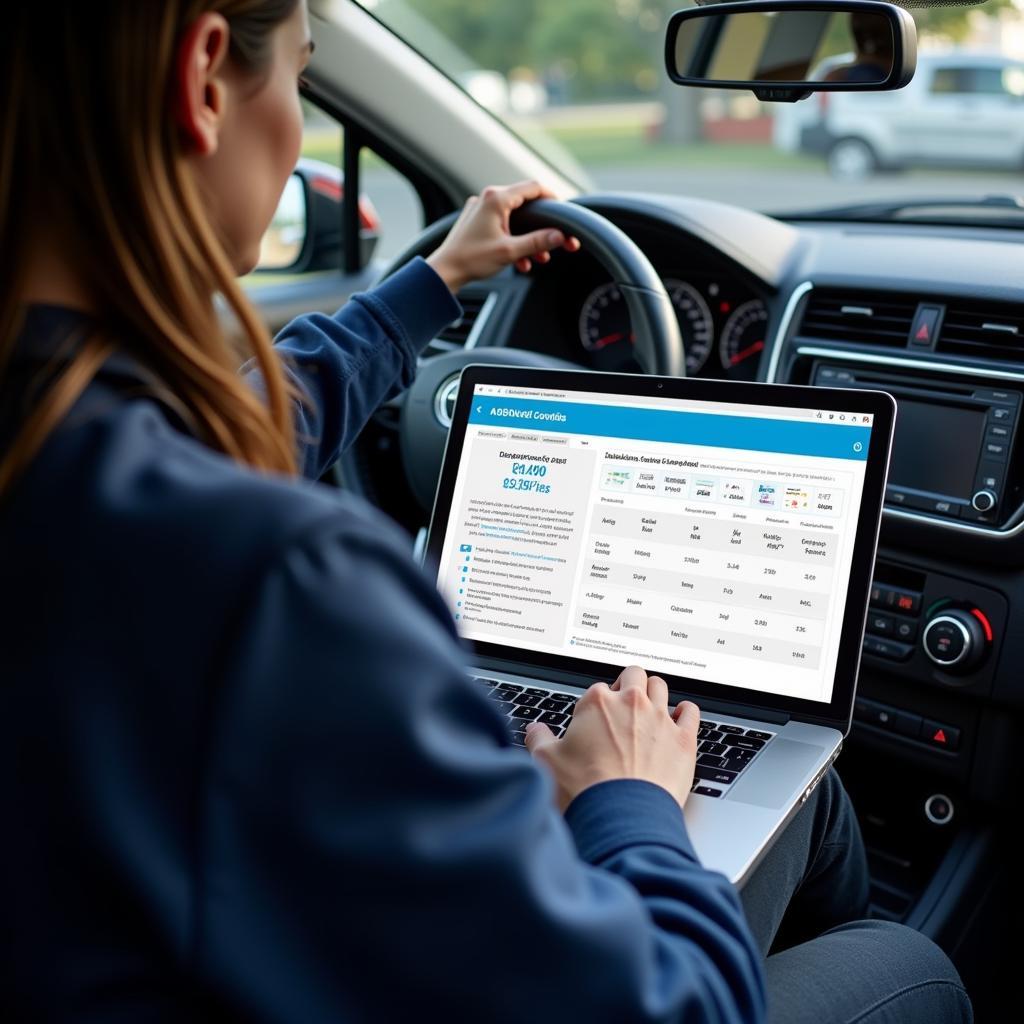Knowing how much it costs to put your car on a diagnostic machine can feel like navigating a maze. Prices can vary wildly, leaving you unsure of what to expect and wary of hidden fees. This comprehensive guide dives into the factors influencing diagnostic costs, helps you decipher quotes, and empowers you to make informed decisions for your car’s health.
Deciphering Diagnostic Costs: More Than Meets the Eye
The cost of car diagnostics isn’t as simple as a one-size-fits-all answer. Several factors come into play, influencing the final price tag:
-
Type of Diagnostic Scanner: Just like phones, diagnostic scanners come in basic and advanced models. Basic scanners might be sufficient for reading simple engine codes, while complex issues might require the expertise of advanced scanners, often found at dealerships or specialized mechanics.
-
Location, Location, Location: Dealerships often charge a premium for diagnostics compared to independent mechanics. Geographic location also plays a role, with urban areas generally experiencing higher labor costs.
-
The Issue’s Complexity: A simple check engine light might be a quick fix, resulting in a lower diagnostic cost. However, intermittent problems or multiple warning lights might demand more in-depth analysis, potentially increasing the price.
-
Shop’s Labor Rates: Each shop sets its own labor rates, impacting the overall cost.
Typical Cost Range: What You Can Expect
While pinpointing an exact price is near impossible without specifics, you can anticipate a general range for diagnostic tests:
-
Basic Diagnostic Scan: This generally costs between $50 to $100. It involves connecting a scanner to your car’s computer, reading error codes, and providing a starting point for further diagnosis.
-
In-Depth Diagnostic Assessment: For more complex issues, expect to pay anywhere between $100 to $400 or more. This might involve a thorough inspection of various systems, specialized tests, and expert analysis.
Beware the Hidden Fees Trap
Always inquire about potential hidden charges before authorizing a diagnostic test. Some shops might add fees for:
-
“Shop Supplies”: These are often miscellaneous items like cleaning solvents or shop towels added to the bill.
-
“Diagnostic Time”: Some shops charge a separate fee for the time spent connecting and interpreting data from the diagnostic machine.
Saving Money on Diagnostics: Smart Strategies
-
Check for Free Diagnostics: Some auto parts stores offer free basic code reading as a customer service.
-
Loyalty Discounts: Regular customers at a particular shop might benefit from discounted or even free diagnostic services.
-
DIY Diagnostic Tools: Affordable OBD-II scanners are available for purchase, allowing you to read basic engine codes yourself.
When is a Diagnostic Test Necessary?
Modern vehicles are equipped with sophisticated onboard computers. When something malfunctions, the check engine light illuminates, and the computer stores a diagnostic trouble code (DTC). This code acts as a starting point for mechanics to pinpoint the issue.
Here are some common scenarios where a diagnostic test is recommended:
-
Illuminated Check Engine Light: This is the most common reason for a diagnostic test.
-
Unusual Noises or Smells: Strange noises from the engine or unusual smells coming from the exhaust could signal underlying problems.
-
Performance Issues: Sudden drops in fuel economy, loss of power, or rough idling can indicate a need for a diagnostic check.
Don’t Ignore the Warning Signs
A diagnostic test is a crucial first step in identifying and addressing car troubles. While cost is a factor, delaying diagnosis can exacerbate the problem, potentially leading to more extensive (and expensive) repairs down the line.
Remember, a stitch in time saves nine. Taking your car for a diagnostic test at the first sign of trouble can save you headaches and potentially hefty repair bills in the long run.
FAQs about Car Diagnostic Costs
Q1: Will a diagnostic test tell me exactly what’s wrong with my car?
A diagnostic test provides error codes that serve as a starting point for diagnosis. It doesn’t always pinpoint the exact problem but guides mechanics toward the affected system for further investigation.
Q2: Is it worth getting a diagnostic test from a dealership even though it’s more expensive?
Dealerships have access to specialized equipment and factory-trained technicians with in-depth knowledge of your car’s make and model. However, if your car is out of warranty, independent mechanics can often perform the same diagnostics at a lower cost.
Q3: Can I refuse repairs after a diagnostic test?
Yes, you have the right to refuse repairs even after a diagnostic test. However, you will likely be charged for the diagnostic service itself.
 Car Owner Reading Diagnostic Report
Car Owner Reading Diagnostic Report
Q4: How often should I get my car’s diagnostics checked?
It’s a good practice to include a diagnostic scan during your regular car maintenance, even if there are no apparent issues. This can help catch potential problems early on.
Q5: Can I use a diagnostic tool myself to fix my car?
While you can use basic DIY scanners to read codes, fixing a car requires mechanical expertise. It’s recommended to leave repairs to qualified professionals to avoid further damage.
Need Expert Assistance with Your Car’s Diagnostics?
Don’t hesitate to reach out! DiagFixPro is here to help you navigate the world of car diagnostics with confidence. Contact our team of expert technicians via WhatsApp at +1(641)206-8880 or email us at [email protected]. We’re available 24/7 to answer your questions, provide personalized advice, and ensure your car receives the best possible care.
Explore more helpful resources on our website:
- Common Car Diagnostic Codes and Their Meanings
- Choosing the Right Mechanic for Your Needs
- Understanding Your Car’s Warning Lights
At DiagFixPro, we’re committed to empowering car owners with the knowledge and support they need to make informed decisions about their vehicles.

Leave a Reply